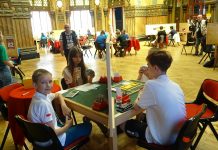Source:
Australian Bridge Federation Newsletter
Four minutes after the announced starting time, the Monday night duplicate game at the Club Bridge Studio got off to its usual smooth start. No sooner had Charlie Club finished collecting the entry tickets than a slight difficulty arose.
“Director!” called Alfred Snoyd, a small crinkly man with steelrimmed bifocals.
“Oh dear,” muttered Miss Reeves, his right-hand opponent.
Charlie walked briskly to their table, where this situation awaited him:
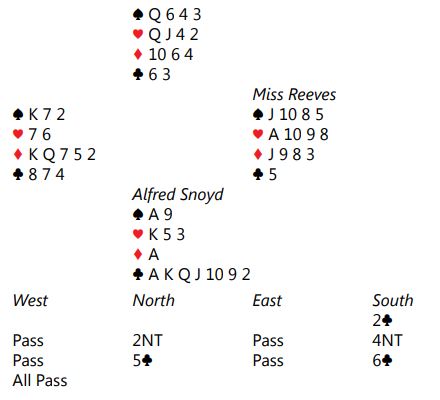
Having heard the bidding repeated and seeing Miss Reeves’

J on the table, Charlie surmised the cause of the disturbance, but he let Miss Reeves unwind herself by telling him.
“The 2

was artificial,” explained Miss Reeves nervously. “I thought this hand (she gestured to her right) bid clubs first and I’m afraid I’ve led out of turn.” Miss Reeves did not care about the penalty. She only hoped the director would not be angry with her for her transgression.
“Well, these things will happen,” said Charlie cheerfully. Taking a Rule Book out of his pocket, he turned to Snoyd. “The new rules give your four options,” he announced. Charlie knew the rules well, but holding the Rule Book lent authority to his statements.
“Four?” queried Snoyd. “I thought there were only three.” Snoyd nodded knowingly as Charlie reeled off the three older options. “Finally,” the director concluded, “you may ask the correct leader to lead a spade, in which case Miss Reeves may pick up her

J and there is no further penalty.”
Snoyd thought for a while and finally decided that he wanted West to lead a spade. West promptly underled the

K, allowing Snoyd’s

Q to win in dummy. Snoyd then drew trumps, knocked out the

A and made his contract easily.
As Charlie walked away from the table, he remarked to himself how happy Alfred Snoyd had been to make his slam with the aid of the new penalty. “Like a child with a new toy,” Charlie mused. “I wonder what things give people the most pleasure. Would everyone get the same enjoyment from a clever choice of penalty? Or would they prefer to make it under their own steam.”
Charlie’s thoughts kept wandering on until he decided on a strange experiment. He saw South’s 6

contract as a tree. The tree had many branches. Charlie wanted the different Souths to see different branches. So, when he helped move the hands between the rounds, he surreptitiously changed the East-West cards around to suit the temperament of the declarer.
At the next table, the South player was Mrs Lansing. Charlie recalled that she had just graduated into his advanced bridge classes. The first lecture had been on throw-in play, and Charlie had prepared a brief examination for his pupil.
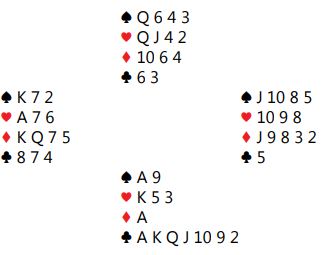
Against Mrs Lansing’s 6

contract, West led the

K. Mrs Lansing won the

A, drew three rounds of trumps and led a heart to the

Q. When this held the trick, she returned a heart to her own

K. West had been watching the cards carefully and, having seen his partner play the spots upwards, ducked this also.
Mrs Lansing now thought hard. From his remote position, Charlie thought he saw a gleam in her eye. She ran off all the trumps. For his last three cards, West had to keep two spades and the

A. Mrs Lansing then kept two spades and one heart in dummy and led a heart, forcing West to lead from his guarded

K.
“Very nice,” complimented Charlie as he picked up the boards a little before the move was called. Mrs Lansing was pink with pleasure.
Charlie had scouted the next table, where South was Bill Flaherty, a big and jovial man. His greatest joy was fooling the opponents out of something they rightly owned. Charlie did not disappoint him.
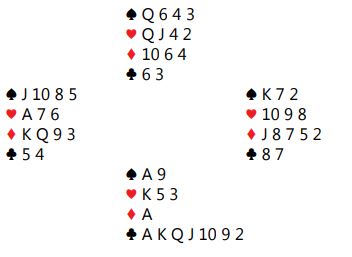
Whenever Bill saw a long, solid suit, he knew it meant he could make the opponents discard a lot, so he reached 6

quick-asa-flash.
West led the

K and Bill’s

A won. He promptly rattled off a few trumps. On the third and fourth rounds of clubs, each of the other players threw diamonds. As Bill led the fifth round of trumps, the position was:
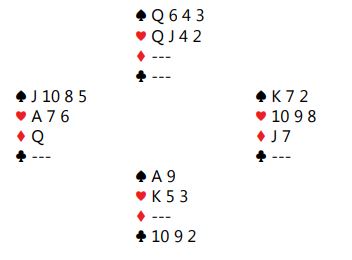
When Bill led the

10, West huddled. Charlie grew anxious, but he knew his customers! West thought vaguely about the diamond position. His partner had dropped the

8 under the

K. Surely he had the

J. No, maybe he was just trying to show four diamonds. If he discarded the

Q and declarer held the

J, his partner would surely yell at him. And a spade discard wasn’t appealing, as declarer had kept all the spades in dummy and probably held the Ace and King three or four times himself. So, West discarded a heart, and Bill Flaherty scored both a small slam and a big chuckle.
And so it went throughout the evening, with Charlie Club allowing each South player to break his or her own limb off the tree of happiness.
On the last round, the board reached the table at which Professor Amesbury was South. The Professor held an important chair at the college nearby and often dropped in for a relaxing evening of bridge. His bidding was unpolished, Charlie had noted, but his play of the cards often approached the expert level. Technical play gave him the most pleasure and, on the last round, the Professor declared the following deal in 6

:
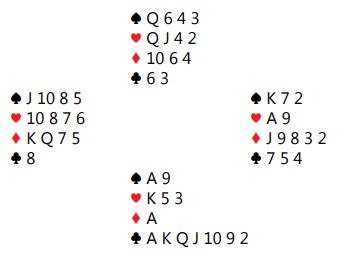
West led the

K to the Professor’s

A. After a longer huddle than any of the other South players had found necessary, the Professor drew trumps (throwing a spade from dummy) and played the

K from his hand. West played the

8 and East won with the

A. East returned a diamond which declarer ruffed. On the next trump, dummy threw another spade, leaving this position:
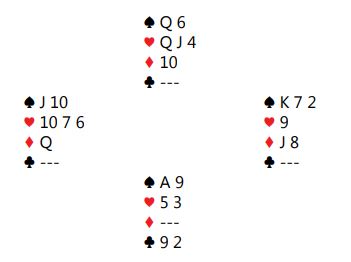
Declarer led the

9 and it was West’s turn to trance. That defender saw that a heart discard would set up dummy’s hearts, and a diamond discard would later expose East to a spade-diamond squeeze. So West threw the

10.
Rising to the occasion, Professor Amesbury discarded the

Q from dummy. On the next trump lead, West was forced to throw his

J. After cashing two hearts in dummy, the Professor finessed the

9, thus equalling the scores of all the other North-South pairs on this board.
Charlie Club was a little cheerier than usual at the end of the evening. As he flipped out the lights and closed the door behind him, he wondered which branch of the tree was his own.
“I think I would take the West cards,” he said to himself. “I’d give myself the

K, four hearts to the Ace, and an opposing South who would lead a heart to the Queen and a heart back to the King. I’d capture the

K with the

A and play a third round of hearts, destroying all the possible end-positions.”
 Having heard the bidding repeated and seeing Miss Reeves’
Having heard the bidding repeated and seeing Miss Reeves’  Against Mrs Lansing’s 6
Against Mrs Lansing’s 6 Whenever Bill saw a long, solid suit, he knew it meant he could make the opponents discard a lot, so he reached 6
Whenever Bill saw a long, solid suit, he knew it meant he could make the opponents discard a lot, so he reached 6 When Bill led the
When Bill led the  West led the
West led the  Declarer led the
Declarer led the 






